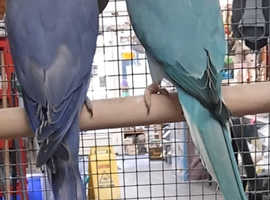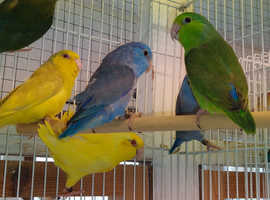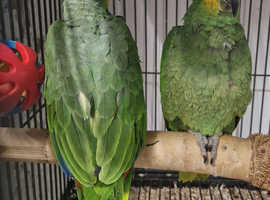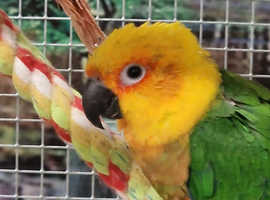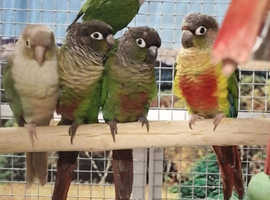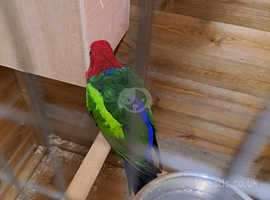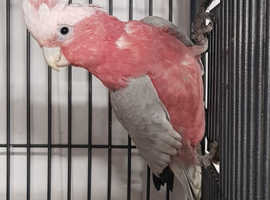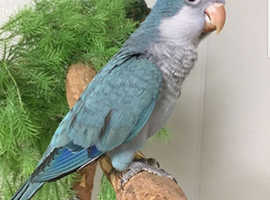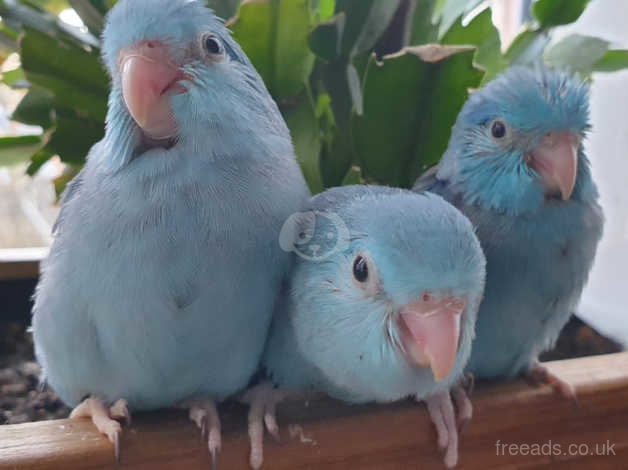We found them a forever home
You may also like
Pacific/Celestial Parrotlets- Available in 2 weeks for Sale in Cardiff
Description:
Cute Pacific / Celestial Parrotlets (Forpus coelestis) available shortly for sale
Recently my Pacific/Celestial Parrotlets had a clutch of 6 birds which are all very healthy and good. Now only few are available while others have been booked for later pick up. They are 10 weeks old now and would be ready to give away in another 2 weeks time when they complete their 12 weeks of legal age to be rehomed. They are weaned. They are hand reared but has been looked after by their parents as in the wild. They are not caged.
These birds are hand tamed and young. Parents can be seen on request.
The Pacific Parrotlet (Forpus coelestis) originating in Mexico and Central and South America, these "pocket parrots" have caught on fast. They have the personality of a "large bird in a small bird's body," and are often compared to Amazon parrots, a family of parrots said to be their close cousins. Indeed, they do resemble the Amazons, with short, stout bodies and a somewhat blunt tail. The male is blue with a blue streak behind the eye and blue on the rump and wing-coverts. Females lack the blue coloring, and may or may not have a faint blue streak behind the eye.
Pacific Parrotlets are not noisy birds, making them great for people living in apartments. They will repeat words and simple phrases, but are not known to be the finest talkers of the parrotlet family. Pacifics are very spirited, and can become aggressive if left for too long without handling. Even though it is tiny, do not underestimate the strong beak -- its bite is much stronger than a budgie. On a scale of 1 - 10 (1 being the weakest and ten being the strongest.) I'd give it a 12. For a budgie its a 2.
Care & Feeding
Parrotlets might be small but that doesn't mean that a small cage will do. A spacious wide cage with 1/4 inch bar spacing is ideal. These are active birds that need their play space and plenty of toys to keep them busy. Parrot kabobs and other shreddable toys are parrotlet favorites, and they also like swings and boings.
Parrotlets should have a pellet-based diet supplemented with fresh fruits and vegetables, as well as some seed. They also need a calcium source, such as cuttlebone. You might have to dice up their fruit so they can sink their tiny beaks into it. Nutri-Berries, Avi-Cakes, Premium Daily Diet are some great Lafeber foods for parrotlets.
Personality & Behavior
Parrotlets in general are feisty, affectionate, and willful. If someone wants a great companion they should keep only one bird, because a pair of parrotlets will probably bond closely to each other to the exclusion of the owner. However, parrotlets are dimorphic and easy to pair up, and they do enjoy each other's company. They can also be kept peaceably in groups in large aviaries, but it's best to keep them separate from other species. They will quibble and fight over object and territory, so keep that in mind.
Males and females make equally good companions depending on the individual. Companionability has much less to do with gender than it does with handling and socialization. Hand-fed parrotlets are very friendly, especially if the guardian takes the time to keep handling the bird. If left alone for too long, a single parrotlet can lose some of its companionability. The Pacific parrotlet, in particular, does not understand that it is a tiny bird, and has little trouble challenging other animals and humans.
Because of the small size, the parrotlet may seem like a great companion for children, but kids would probably be better off with a budgie or something in the Neophema family. The parrotlet can be temperamental and feisty, and its bite packs a wallop.
Speech & Sound
These birds can learn to mimic, but they aren't the best talkers of the parrot family. Some individuals can learn quite a few words, however. They aren't noisy, so neighbors won't be disturbed.
Similar Pets
-
 VipMemberHand reared Super friendly cuddly Talking Parrot...£195
VipMemberHand reared Super friendly cuddly Talking Parrot...£195 -
 VipMemberGreenwing kings£500
VipMemberGreenwing kings£500 -
 6 months old Indian ringneck parrot£135
6 months old Indian ringneck parrot£135 -
 VipMemberStunning Baby Jenday Parrot£315
VipMemberStunning Baby Jenday Parrot£315 -
 VipMemberStunning Galah Cockatoo£825
VipMemberStunning Galah Cockatoo£825 -
 VipMemberBaby Ringneck Parrots...Blue Green£130
VipMemberBaby Ringneck Parrots...Blue Green£130 -
 VipMemberBaby Mix Conure Parrots£135
VipMemberBaby Mix Conure Parrots£135 -
 VipMemberBaby Quaker Parrots£140
VipMemberBaby Quaker Parrots£140 -
 VipMemberStunning Baby Kakirikies£75
VipMemberStunning Baby Kakirikies£75 -
 VipMemberStunning Patagonion Parrots£280
VipMemberStunning Patagonion Parrots£280 -
 VipMemberBaby Derbyan Parrots£285
VipMemberBaby Derbyan Parrots£285 -
 VipMemberRARE Baby Australian King Parrots£175
VipMemberRARE Baby Australian King Parrots£175 -
 VipMemberLook! Baby Alexandrine Parrots£325
VipMemberLook! Baby Alexandrine Parrots£325 -
 VipMemberBaby Parrotlets Available£55
VipMemberBaby Parrotlets Available£55 -
 VipMemberBaby AMAZON PARROTS£595
VipMemberBaby AMAZON PARROTS£595
